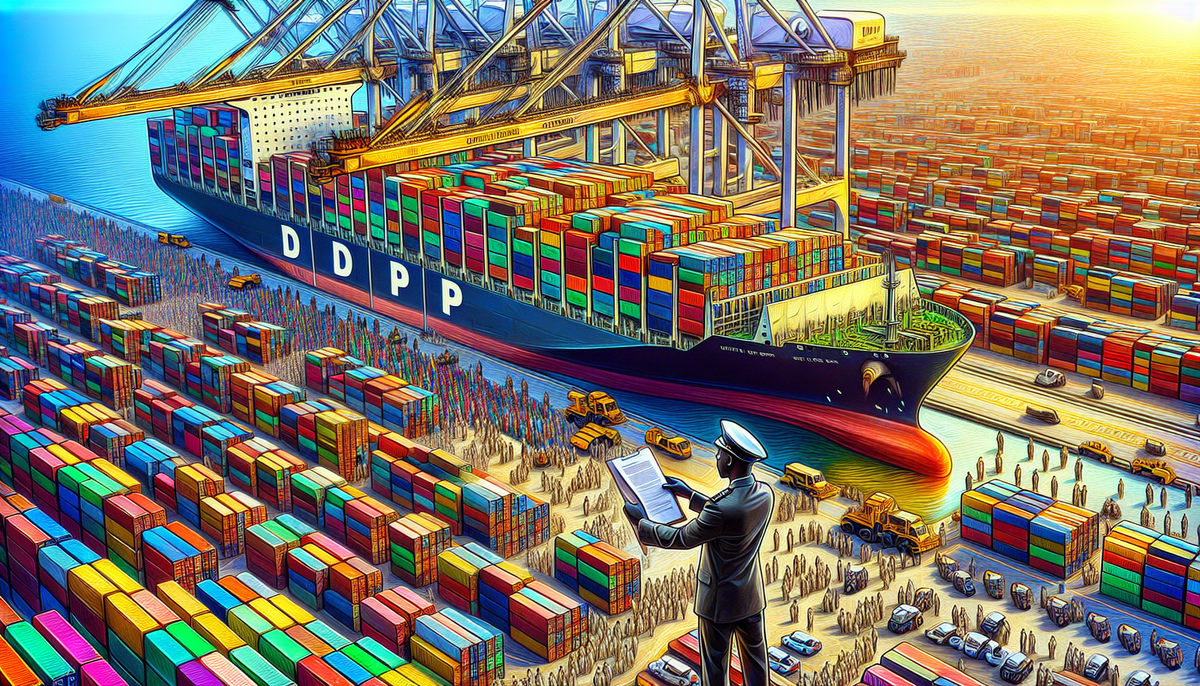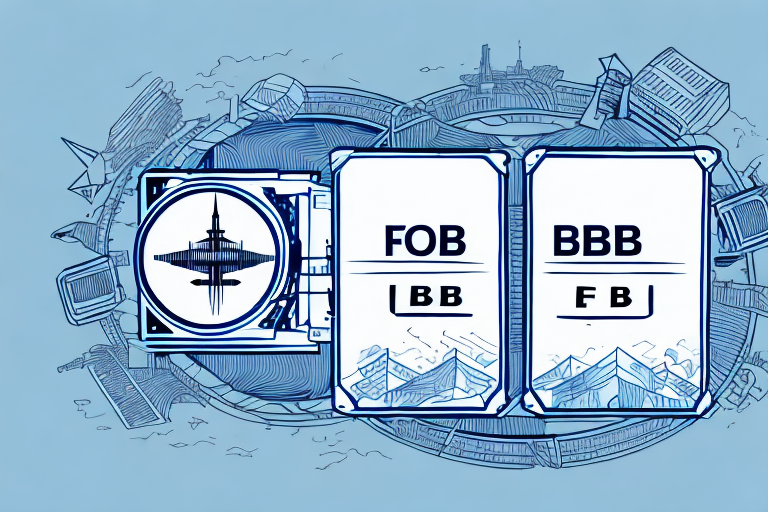What is Delivered Duty Paid (DDP) and How Does it Work?
Delivered Duty Paid (DDP) is a pivotal Incoterm (International Commercial Term) in international trade that outlines the responsibilities and obligations of both the buyer and the seller during the shipment of goods across borders. Under DDP, the seller assumes full responsibility for delivering the goods to the buyer's specified location, including all costs and risks involved in the transportation process, such as export and import duties, taxes, and customs clearance.
In this comprehensive guide, we will explore the intricacies of DDP, its advantages and disadvantages, how it compares to other Incoterms, and best practices for its implementation in your business operations.
The Importance of Understanding Delivered Duty Paid (DDP)
Navigating the complexities of international trade requires a thorough understanding of various Incoterms, and Delivered Duty Paid (DDP) stands out as one of the most comprehensive terms. Mastery of DDP ensures that businesses can efficiently manage the logistical and financial aspects of importing and exporting goods, minimizing risks and avoiding costly mistakes.
According to the 2023 International Trade Report, businesses that effectively utilize DDP experience a 15% reduction in unexpected shipping costs due to the predictable cost structure DDP provides. This predictability is invaluable for budgeting and financial planning, enhancing overall business stability.
Defining Delivered Duty Paid (DDP): Responsibilities and Obligations
Under the DDP Incoterm, the seller is accountable for virtually every aspect of the shipment process. This includes:
- Packaging and labeling goods according to international standards.
- Arranging and paying for transportation from the seller's premises to the buyer's designated location.
- Handling all export and import duties, taxes, and customs clearance procedures.
- Providing necessary documentation to facilitate the smooth transfer of goods.
Conversely, the buyer's primary responsibilities entail:
- Receiving the goods at the agreed-upon location.
- Ensuring that a suitable facility is available for receiving the goods.
It is crucial to note that DDP does not cover services beyond delivery, such as unloading or unpacking the goods, unless explicitly stated in the contract.
Advantages and Disadvantages of Using Delivered Duty Paid (DDP)
Advantages
- Predictable Costs: Buyers have a clear understanding of total costs upfront, eliminating surprises related to duties and taxes.
- Streamlined Logistics: Sellers manage the entire shipping process, reducing the logistical burden on buyers.
- Enhanced Customer Satisfaction: Transparent pricing can lead to increased trust and satisfaction among buyers.
- Compliance Assurance: Sellers are responsible for ensuring compliance with export and import regulations, reducing legal risks for buyers.
Disadvantages
- Higher Costs for Sellers: Sellers bear the financial burden of duties, taxes, and transportation costs, which can affect profit margins.
- Extended Delivery Times: Managing all aspects of shipping can lead to longer delivery times, especially if customs clearance faces delays.
- Limited Buyer Control: Buyers have less oversight over the shipping process and reliance on the seller for timely delivery.
- Complexity in Pricing: Accurately pricing goods to include all potential costs can be challenging for sellers.
Determining if Delivered Duty Paid (DDP) is Right for Your Business
Choosing the appropriate Incoterm is a strategic decision that impacts your supply chain efficiency and financial performance. To assess whether DDP aligns with your business objectives, consider the following factors:
- Control Over Shipping: If maintaining tight control over the shipping process is essential, DDP may limit your influence.
- Cost Management: Evaluate whether your business can absorb the additional costs associated with DDP or if these costs can be passed on to customers.
- Market Expectations: Understand the expectations of your target market regarding shipping terms and cost transparency.
- Regulatory Compliance: Ensure that you have the necessary expertise or partnerships to handle the complexities of international regulations under DDP.
Consulting with a trade expert, as recommended by ShipScience Consulting Services, can provide personalized insights into whether DDP is suitable for your specific business needs.
How Delivered Duty Paid (DDP) Compares to Other Incoterms
Understanding how DDP differentiates from other Incoterms can help in making informed decisions about your international shipping strategies. Here are comparisons with some commonly used terms:
DDP vs. CIF (Cost, Insurance, and Freight)
While both DDP and CIF involve the seller covering significant shipping costs, CIF specifically includes insurance during transit and places the risk on the buyer once the goods pass the ship's rail at the port of departure. In contrast, DDP transfers all risks and costs to the seller until the goods reach the buyer's specified location.
DDP vs. FOB (Free on Board)
Under FOB, the seller is responsible for delivering the goods to the port of shipment and loading them onto the vessel. Once the goods are on board, the risk transfers to the buyer, who then handles freight, insurance, and import duties. DDP shifts more responsibility and cost to the seller throughout the entire shipping process.
DDP vs. EXW (Ex Works)
Ex Works (EXW) represents one of the most buyer-advantageous Incoterms, where the seller's responsibility is minimal, limited to making the goods available at their premises. The buyer handles all subsequent logistics, including transportation, insurance, and import duties. In contrast, DDP places the maximum responsibility on the seller.
Legal and Financial Implications of Delivered Duty Paid (DDP)
Adopting DDP has significant legal and financial consequences for both parties involved in international trade. It's imperative to understand these implications to mitigate risks effectively.
Legal Responsibilities
- Seller: Must comply with all export regulations, obtain necessary licenses, and ensure the goods meet the destination country's import requirements.
- Buyer: Needs to provide accurate information for customs clearance and adhere to any local regulations upon importation.
Financial Responsibilities
- Seller: Bears all costs related to transportation, insurance, duties, and taxes, which can affect pricing strategies and profit margins.
- Buyer: Enjoys cost transparency but may face higher upfront costs for goods due to the inclusion of all associated fees.
Failure to comply with legal obligations under DDP can result in penalties, shipment delays, or legal disputes. According to ShipScience Legal Resources, businesses should engage in thorough contract reviews and possibly consult legal experts to ensure all terms are clearly defined and adhered to.
Common Misconceptions About Delivered Duty Paid (DDP) Explained
Several misconceptions surround the use of DDP, potentially leading to misunderstandings and misapplications of the term in international trade.
Misconception 1: DDP Eliminates All Buyer Responsibilities
While DDP shifts many responsibilities to the seller, the buyer still plays a critical role in providing accurate information for customs clearance and facilitating the release of goods. The buyer must ensure that all necessary documentation is correct and complete to avoid delays or additional costs.
Misconception 2: DDP Always Results in Lower Total Costs
Although DDP offers price transparency, the total cost may be higher compared to terms where the buyer handles certain expenses directly. Sellers might incorporate additional costs into the price to cover duties and taxes, potentially leading to less competitive pricing.
Misconception 3: DDP Simplifies All Aspects of Shipping
While DDP can streamline logistics by centralizing responsibility, it also requires the seller to manage a complex array of tasks, which can be challenging without adequate infrastructure or expertise.
A Step-By-Step Guide to Implementing Delivered Duty Paid (DDP) in Your Business
Successfully implementing DDP involves meticulous planning and execution. Follow this step-by-step guide to integrate DDP into your international shipping operations:
- Assess Your Business Needs: Determine if DDP aligns with your business model, customer expectations, and financial capabilities.
- Consult with Trade Experts: Engage with specialists to understand the nuances of DDP and its impact on your operations.
- Negotiate Terms with Partners: Clearly define the roles and responsibilities of all parties in your shipping agreements.
- Ensure Compliance: Verify that your business complies with both export and import regulations, including obtaining necessary permits.
- Calculate Costs Accurately: Incorporate all possible expenses, including transportation, duties, taxes, and insurance, into your pricing strategy.
- Streamline Documentation: Implement systems to manage and organize all required customs and shipping documents efficiently.
- Choose Reliable Logistics Partners: Partner with reputable freight forwarders and carriers experienced in DDP shipments.
- Monitor Shipments: Utilize tracking systems to monitor the progress of your shipments and address any issues promptly.
Best Practices for Negotiating Delivered Duty Paid (DDP) Agreements with Suppliers
Effective negotiation is key to establishing successful DDP agreements. Here are best practices to consider:
- Clarify Responsibilities: Ensure that both parties have a mutual understanding of their obligations under DDP.
- Include All Costs: Make sure that the agreement clearly states that the seller will cover all costs, including shipping, duties, and taxes.
- Set Clear Delivery Terms: Define the exact delivery location and ensure it is practical and accessible for both parties.
- Verify Documentation: Confirm that the supplier possesses all necessary documentation and permits for exporting goods.
- Establish Communication Channels: Maintain open lines of communication to swiftly address any issues that may arise during the shipping process.
Tips for Avoiding Common Pitfalls When Using Delivered Duty Paid (DDP)
To ensure smooth transactions and mitigate risks associated with DDP, consider the following tips:
- Accurate Documentation: Double-check all shipping and customs documents to prevent delays or fines.
- Partner with Trusted Logistics Providers: Collaborate with reliable freight forwarders and carriers who have experience with DDP shipments.
- Monitor Shipments Actively: Use tracking tools to keep tabs on your shipments and respond proactively to any issues.
- Budget for All Costs: Ensure that your pricing strategy accounts for all expenses related to DDP to maintain profitability.
- Stay Informed: Keep up-to-date with changes in international trade regulations and tariffs that may impact your shipments.
Case Studies: Companies Successfully Implementing Delivered Duty Paid (DDP)
Examining real-life examples can provide valuable insights into the effective implementation of DDP. Here are a couple of case studies:
Case Study 1: Electronic Retailer Enhances Customer Satisfaction
Company X, a leading electronics retailer, adopted DDP for its suppliers based in China. By specifying clear delivery locations and ensuring all necessary documentation was in place, Company X was able to offer comprehensive price quotes that included freight, insurance, and customs fees. This transparency boosted customer trust and led to a 20% increase in sales within the first year of implementation.
Case Study 2: Apparel Brand Streamlines International Shipping
An emerging apparel brand utilized DDP to manage its international shipments to Europe. By partnering with a reputable freight forwarder and handling all import duties and taxes, the brand reduced shipping-related queries and increased operational efficiency. As a result, the company experienced a 30% reduction in shipping delays and improved overall customer satisfaction ratings.
Future Trends in the Use of Delivered Duty Paid (DDP) in International Trade
The landscape of international trade is constantly evolving, and so are the dynamics of Incoterms like DDP. Future trends suggest an increasing reliance on DDP due to several factors:
- Growth in E-commerce: The surge in global online shopping necessitates more comprehensive shipping terms like DDP to enhance customer experience.
- Technological Advancements: Improved tracking systems and automation in customs procedures make managing DDP shipments more efficient.
- Regulatory Harmonization: Ongoing efforts to harmonize international trade regulations could simplify the complexities associated with DDP.
- Sustainability Considerations: Businesses are incorporating sustainable practices into their shipping processes, and DDP can help manage and monitor these initiatives effectively.
As highlighted by recent industry reports from ShipScience Insights, the adoption of DDP is expected to rise, driven by the need for streamlined and cost-effective international shipping solutions.
Conclusion
Delivered Duty Paid (DDP) is a robust Incoterm that offers significant advantages for businesses engaged in international trade by providing cost transparency and streamlined logistics. However, it also introduces complexities and responsibilities that require careful consideration and management. By understanding the intricacies of DDP, leveraging best practices, and learning from successful case studies, businesses can effectively implement DDP to enhance their international shipping operations, improve customer satisfaction, and drive profitability.




















